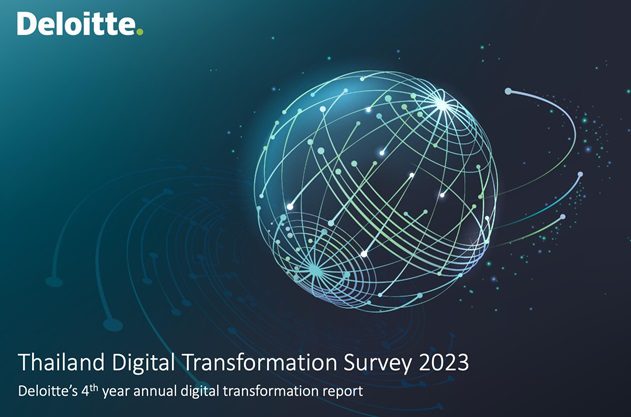Deloitte Thailand launched the latest result of its annual Thailand Digital Transformation Survey, a comprehensive study to understand the digital implementation perspectives and trends among companies in Thailand.
Thailand Digital Transformation Survey has been conducted for four consecutive years from 2020 to 2023 with main objective to examine the attitudes towards digital transformation among companies. The report reflects the perspectives of both c-suite level and non-executive level respondents across 5 industry sectors including Consumer, Energy Resources & Industrials, Financial Services, Life Science & Healthcare, and Technology, Media and Telecommunications. This year’s report mainly highlights three key topics, reflecting the development of digital transformation implementation, as follow.
- Exploring the age of digital disruption
- Unlocking success in digital transformations
- Industry snapshot
Throughout 2021-2023, the sentiment towards the impact of digital disruption remained largely moderate. Businesses are broadly divided into two categories based on their relationship with technology:
- Tech-Centric Enterprises: These businesses, with technology at their core, feel less affected by digital disruption as their inherent operations require them to keep abreast with digital innovations.
- Traditionalists: This group prefers a limited tech adoption, relying on digital technology to enhance their internal mechanisms to remain its competitiveness in their sector.
In terms of digital adoption analysis in each year, there are annual variations between 2021-2023. According to the report, 2021 witnessed a surge in companies swiftly adopting digital initiatives in the early Covid-19 outbreak; however, inexperience and rapid implementation led to less-than-ideal improvements in several businesses. With lessons learned, 43% of companies remain in “Doing Digital” phase as they adopted a more discerning and strategic approach, resulting in more successful digital transformations in 2022-2023. This shift can be attributed to accumulated experience and smart technology choices.
When it comes to business-centric Insights, the majority of respondents leveraged mobile applications and websites for customer engagement, with chat apps and instant messaging serving as preferred communication tools. Traders displayed a considerable inclination towards revamping business models and honing customer insights, while service providers leaned into customer-centric approaches, cybersecurity, and developing digital ecosystems.
Considering the industry dynamics, businesses fundamentally rooted in technology—especially those in the Technology, Media & Telecommunications sectors—and companies in the consumer sector racing to capture market share have outperformed others in their digital transformation endeavors. When comparing 2022 to 2023, a noteworthy surge was observed in businesses keen on investing in technology, with data analytics taking the lead across all sizes of companies.
Narain Chutijirawong. Ph.D, Executive Director Clients and Markets, Deloitte Thailand stated, with the growth in a company’s size, it typically embraces a broader array of technologies, primarily due to increased financial resources and the heightened complexity of its business systems. Nevertheless, the adoption of data analytics has shown a substantial annual increase, irrespective of the company’s size.
Cost reduction and increased productivity are the top two successful results for digital transformation implementation. However, executives and non-executives offered contrasting perspectives for the third results. The C-suite level ranked reduced operational risks as the third, while non-executive professionals stressed on the elevated customer experiences because they may interact more closely with clients.
The top challenge remains as human resource capability, followed by insufficient budget and resources and immature digital culture, found in 60%, 57% and 47% of companies respectively. The aftermath of the COVID-19 economic downturn has placed constraints on budgets designated for digital transformation. A potential solution emerging is the inclination towards IT outsourcing via cloud-based platforms to reduce costs. Moreover, the introduction of the Personal Data Protection Act (PDPA) brings to the fore challenges centered on data privacy.
Mr. Gobind Rattivarakorn, Executive Director, Deloitte Consulting stated that organizations that have progressed further in their digital transformation efforts were observed to experience fewer challenges in resource management and, in turn, shift their focus to addressing matters concerning data privacy and security.
Digital transformation is a journey that never ends. The pandemic demands swift responses from businesses to innovate and adapt to a new pace of change. Now is the time to embrace new opportunities for a brighter future and digital transformation is the essential bridge between nowadays business and the business of tomorrow.
For the 4th year of Thailand Digital Transformation Survey Report, please visit https://www2.deloitte.com/th/en/pages/technology/articles/th-digital-transformation-survey-report-2023.html


